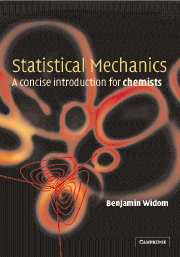5 - The third law
Published online by Cambridge University Press: 05 June 2012
Summary
Nernst heat theorem in thermodynamics
The “third law of thermodynamics,” unlike the first and second laws, does not introduce any new functions of state but rather asserts a universal behavior of the entropy at low temperatures. The most useful form of the third law is the Nernst “heat theorem,” a simplified statement of which is that the entropies of substances approach 0 at the absolute zero of temperature. This statement, which needs much qualification, is explained more fully in this section (a reminder of what one may have learned in thermodynamics), and then its statistical mechanical basis is presented in §5.2.
Suppose a system undergoes a change in its thermodynamic state at a fixed temperature T (isothermal change), and that the accompanying entropy change is ΔST. The subscript reminds us that the entropy change in general depends on the temperature T at which the process occurs. The process could be a chemical reaction, a change of physical state (melting, for example, or transformation between two different crystalline forms), an isothermal expansion or compression, etc. We ask only that the system in both its initial and final states be in a condition of complete internal equilibrium so that it would be possible in principle to carry out the process reversibly (however it may actually be carried out) and so that the system has well defined values of its thermodynamic functions both initially and finally.
Information
- Type
- Chapter
- Information
- Statistical MechanicsA Concise Introduction for Chemists, pp. 69 - 80Publisher: Cambridge University PressPrint publication year: 2002
